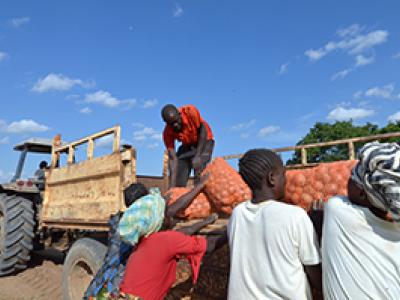
Zambia is highly vulnerable to climate change as its socio-economic development and livelihoods are very much dependent on natural resources.
Almost 72 percent of the Zambian population are engaged in agricultural activities, of which almost 65 percent are women. Many are smallholder farmers that are reliant on rain-fed agriculture and unsustainable land use practices, which leaves them extremely vulnerable to the effects of climate change and variability.
To tackle these vulnerabilities, the Government of Zambia, with support from the NAP-Ag Programme, are thinking ahead into the medium and long-term and advancing the processes by which adaptation strategies are integrated into national development plans and budgets.
Thematic areas:
Level of intervention:
- National
Key collaborators:
- National Governments
Implementing agencies and partnering organizations:
- United Nations Development Programme (UNDP)
- Food and Agriculture Organization of the United Nations (FAO)
- Federal Ministry for the Environment, Nature Conservation and Nuclear Safety (BMU)
Project status:
Completed
Location:
Zambia

Adaptation policies
In response to the climate change challenges, the Zambian Government facilitated the formulation of the National Policy on Climate Change, which was adopted in 2016.
The same year, Zambia also produced its Intended Nationally Determined Contribution (INDC), which focuses its priority adaptation actions on building resilience in the agriculture sectors.
The NAP process started in 2014 and is supported by the NAP-Ag Programme to facilitate the integration of agriculture in this process.
NAP-Ag activities
The NAP-Ag is focusing on: strengthening individual and institutional capacities of the agricultural sectors on NAPs, including on climate scenarios, cost-benefit analysis, and gender-sensitive adaptation options and value chains; the sensitization of stakeholders on NAPs and the formulation of a roadmap for integrating agriculture sector adaptation concerns into the Zambia NAP; generating case studies based on cost-benefit analysis of tested adaptation options; and the advocacy of NAPs, knowledge sharing and outreach.
NAP roadmap for the agriculture sectors (2018)
Drafting a roadmap for NAP in the agriculture sector in a participatory matter, involving all relevant stakeholders from the line ministries but also other sectors and institutions.
Cost–benefit analysis (2017)
Technical officers from key ministries have been trained on conducting cost-benefit analysis and work is on-going to develop a case study, focusing on the effectiveness of early warning systems in planning for adaptation and agriculture with additional analysis of gender dynamic. More
Gender mainstreaming (2017)
A workshop was hosted to discuss potential entry-points for work on gender and market value chains, and line up activities on impact evaluation. More
Impact evaluation (IE) (2017)
A workshop took place to provide an introductory training on impact evaluation, for technical staff of Ministries and civil society in November 2017. A case study is now being drafted to illustrate the application of this methodology in Zambia. IE is a decision-making tool that can help the countries mainstream the use of economic tools in the budgeting and decision-making processes around adaptation and agriculture.
Resource mobilization (2017)
A draft proposal for Zambia's NAP to access funds from the Green Climate Fund's (GCF) Readiness and Preparatory window was prepared in March 2018 which was reviewed by the Climate Change Technical Committee in November 2017. The proposal is under its final review process before submission to the GCF, with the support of the Global Water Partnership.
> Zambia is stepping up efforts for a climate-resilient future
23 May 2018, Lusaka, Zambia - Two back-to-back workshops took place in Lusaka between 21 - 23 May, to convene representatives from line Ministries, relevant sectors and institutions, and all key stakeholders, to outline next steps for drafting a roadmap for the development and implementation of a NAP in the agricultural sectors.
> Enhancing the integration of gender into Zambia’s climate change responses
23 October 2017, Zambia – As part of the ongoing work to address gender issues in the formulation and implementation of a NAP for the agriculture sector in Zambia, FAO and UNDP organised a four-day workshop in Siavonga, Zambia from 18 to 21 September 2017.
Reports and Publications of relevance to Country Teams
Reports and Publications by country teams
Newsletter



